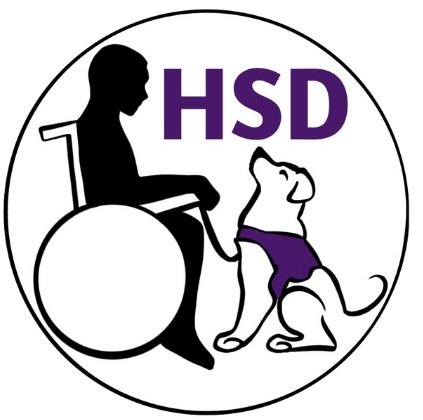Psychiatric Service Dogs
Psychiatric service dogs are specially trained to assist individuals with mental health conditions or learning disabilities. They provide invaluable support by performing tasks that help their owners manage their symptoms and promote a greater sense of independence.
These dogs play a crucial role in enhancing the well-being and quality of life for those they serve, helping them navigate everyday challenges with greater ease and confidence.
Service dogs are specially trained to help mitigate the challenges faced by their handlers with mental health conditions. Here are some of the tasks a psychiatric service dog might perform:
Agitation response: Recognizing signs of distress and providing comfort.
Creating a safe personal space: Acting as a buffer to help their handler feel secure in crowded areas.
Assisting to exit a social situation: Helping the handler leave if they experience a panic attack.
Blocking: Physically positioning themselves to shield their handler from unwanted attention.
Bracing: Leaning against their handler to provide grounding during moments of anxiety.
Deep Pressure Therapy: Applying pressure to help calm their handler during distress.
Interrupting harmful behaviors: Redirecting the handler during episodes of self-harm or repetitive actions.
Fetching items: Bringing necessary items like medications or a phone during a crisis.
Grounding techniques: Such as providing deep pressure therapy during anxiety attacks.
Guiding away from chaos: Leading their handler to a quieter space when feeling overwhelmed.
Routine reminders: Helping the handler stay on track with daily tasks, such as eating and sleeping.
These tasks empower individuals to manage their conditions more effectively and lead fuller, more independent lives.
▢ Agitation response
▢ Assist in creating a safe personal space
▢ Assist to leave social situation (panic attack)
▢ Block
▢ Brace or lean against handler (grounding)
▢ Buffer in crowded places
▢ Cover
▢ Crying interruption/response
▢ Deep Pressure Therapy
▢ Emotional overwhelm interruption
▢ Fetch items
▢ Find location/item
▢ Flashback interruption
▢ Follow designated person
▢ Grounding
▢ Guide away from chaos
▢ Interrupt dissociation
▢ Interrupt freezing behavior
▢ Interrupt harmful behavior
▢ Interrupt panic/anxiety attack
▢ Interrupt repetitive behaviors
▢ Interrupt scratching/ skin picking
▢ Meltdown interruption
▢ Nightmare interruption
▢ Provide distraction
▢ Provide excuse to leave uncomfortable situation
▢ Reorient to the here & now (lick, pets)
▢ Respond to smoke alarm
▢ Routine reminders (feed dog, eat meals, go to sleep, with alarm set)
▢ Snuggle
▢ Summon help from specific person
▢ Watch my back
Kiara alerts and intervenes with anxiety and panic attacks.
When she has noticed an increase in fidgeting and zoning out, she will come and boop me or put her paw on me to get my attention and bring me back to reality.
With my panic/anxiety attacks, I usually try and curl up and she will squish her way in, lay on me (Deep Pressure Therapy) and nose my hands onto her so I pat her instead of any self harm actions.
— Kayleigh N in Ft Myers, Florida
Jojo alerts to me when I’m starting to get emotionally overwhelmed. He interrupts me when I’m having a meltdown. He is amazing at guiding me away from chaos when things are getting too loud and overwhelming. He knows when I’m dissociating and will lick my face/ paw at me to ground me.
His new favourite thing he taught himself is to knock at my phone/ get between my hand and phone when he can tell I’ve been on it too long and am getting overwhelmed.
— Zanna H in Boston, Massachusetts



